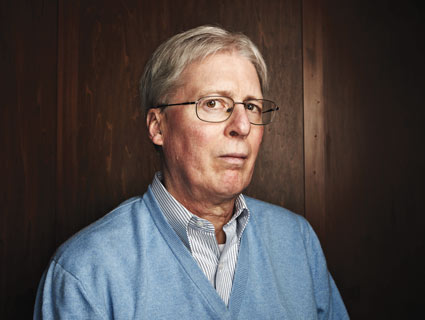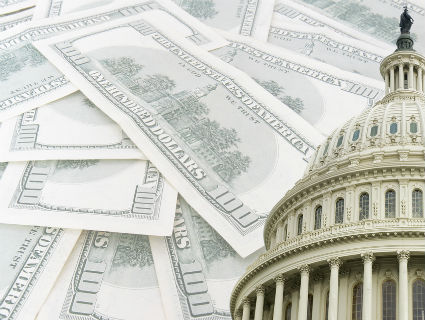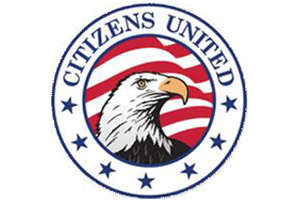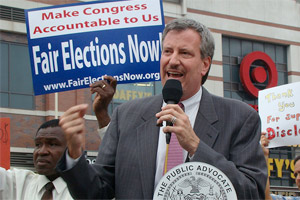
Photo: Jay Fram
IN JANUARY 2008, James Bopp got laughed out of court—literally. The white-haired lawyer from Terre Haute, Indiana, was appearing before a federal three-judge panel in Washington, DC, to argue that his client, a small conservative nonprofit named Citizens United, should be able to air Hillary: The Movie on on-demand TV during the Democratic presidential primaries. Citizens United had produced the film to show that Hillary Clinton was a “European socialist” and ruthless political schemer—a cross between Machiavelli and Lady Macbeth who “looks good in a pantsuit,” as Ann Coulter put it in the movie. Also featured was Kathleen Willey, who accused Bill Clinton of hugging and kissing her in the White House—and who suggested in the film that Clinton had helped hatch a plot to assassinate her cat.
The Federal Election Commission (FEC) told Citizens United that it couldn’t air or advertise the film during primary season, because it amounted to a 90-minute campaign ad that didn’t identify who’d paid for it. In court, Bopp argued that the movie wasn’t so different from what you’d see on 60 Minutes, and its creators deserved First Amendment protections.
At that point, US District Court Judge Royce Lamberth laughed out loud. “You can’t compare this to 60 Minutes,” he said. “Did you read this transcript?”
No one was laughing two years later, when the Supreme Court reversed Lamberth’s ruling and adopted many of Bopp’s arguments—a decision that wiped out 100 years of precedent in campaign-finance law. Building on a key 1976 decision that campaign spending was a form of speech and therefore protected by the First Amendment, the justices in Citizens United v. FEC extended that protection to corporations. They ruled that corporations (which already are considered “persons” for many constitutional purposes) have First Amendment rights similar to those of average voters, and keeping them from spending money to support or defeat specific candidates is unconstitutional.
Citizens United was the culmination of years of work by Bopp to chip away at the nation’s campaign-finance regulations, often via obscure cases no one expected him to win. But Bopp’s not done—not by a long stretch. Today, the 63-year-old lawyer is pursuing challenges to dismantle practically every facet of campaign-finance regulation. Taken individually, many of those cases look just as preposterous and doomed as Citizens United did in 2008. But laugh at your peril.
Bopp is leading “a very broad-based litigation assault being waged against both state and federal campaign-finance laws,” says Tara Malloy, associate counsel at the Campaign Legal Center, a nonprofit legal organization. Reformers see Bopp as using his clients—often small, mission-driven organizations—to widen loopholes in the law that end up benefiting wealthy corporations and their political allies. Arn Pearson, the vice president for programs at Common Cause, calls him “a straw man for the Republican Party for their effort to dismantle campaign-finance laws.”
But as Bopp himself likes to say, the First Amendment is not a loophole. His work highlights the conflicts inherent in trying to restrict the flow of money into the political system without limiting free speech. And in that quest, he’s had some unusual allies. In many cases, including Citizens United, advocates from the ACLU, the Reporters Committee for Freedom of the Press, and the AFL-CIO have filed supporting briefs.
The judge in DC may have laughed at Bopp’s assertion that the Hillary movie was like 60 Minutes, but in the end, it proved difficult to show that the government has a compelling interest in prosecuting someone for putting a political film on TV. Even Supreme Court Justice Elena Kagan, who as US solicitor general argued the government’s case in Citizens United, acknowledged during oral arguments that under the regulations Bopp was challenging, a book about a candidate could theoretically be banned as an illegal advertisement.
But the consequences of Citizens United have gone far beyond protecting books and movies. Because it allowed unlimited corporate spending in elections, groups like Karl Rove’s American Crossroads were able to raise and spend hundreds of millions with very little public disclosure (see chart).
Burt Neuborne, a noted civil libertarian and former ACLU official who’s filed amicus briefs against many of Bopp’s cases, says Bopp is using the First Amendment to create a sort of Wild West system where anyone can spend whatever they please, however they choose. “If you view it as a deregulation device,” he notes, “then you’ve created a power vacuum into which someone will crawl. The people who have moved into the power vacuum in the First Amendment are the rich and powerful.”
One thing no one can dispute is Bopp’s impressive record in the courts. Even before Citizens United, he’d won a Supreme Court ruling striking down big chunks of the McCain-Feingold campaign-finance law. He was instrumental in Bush v. Gore, and he successfully beat back a massive lawsuit from the FEC alleging that the Christian Coalition had illegally campaigned on behalf of candidates including Oliver North, Jesse Helms, and Newt Gingrich. And now he’s pursuing dozens of other cases that, if successful, could eliminate caps on political contributions, allow campaigns to hide their donors from public view, and kill public-financing laws across the nation.
Common Cause’s Pearson, who has been litigating against Bopp since the mid-1990s, warns, “In the end, if they are successful, we’ll have a system where the wealthiest dominate the campaign completely.”
IN JANUARY, I caught up with Bopp at the winter meeting of the Republican National Committee, of which he is a member. (The RNC has been a major funder of Bopp’s work—paying him at least $1.5 million in fees in cases involving GOP candidates—along with the National Rifle Association and conservative megadonors such as Amway billionaire Betsy DeVos.)
The previous year, Bopp had made headlines at the same meeting for proposing that the RNC adopt a resolution—ridiculed as a “purity pledge”—requiring candidates it funded to adhere to at least eight of ten positions on hot-button issues, including abortion and immigration. (A watered-down version of the pledge passed.) This time, fresh from hip surgery, he was there to help orchestrate the ouster of chairman Michael Steele and his replacement by Wisconsin GOP leader Reince Priebus. The limp didn’t seem to slow him down as he dashed from meeting to meeting to press his agenda.
Clad in a brown sweater and sitting awkwardly with a cane at his side, Bopp looked far more mortal than you might expect for “the man behind our secret elections,” as Common Cause recently dubbed him (PDF). When I asked him about the allegation that he uses his small, nonprofit clients as cover for a big-business agenda, a frustrated look crossed his face. He’d happily represent corporate clients, he said, “if they’d hire me.” The problem, he said, was that those clients want their lawyers in DC, not Indiana.
Not that Bopp is apologetic about staying close to home. Working out of Terre Haute has helped him keep his overhead low, allowing him to take on the small nonprofit clients that made perfect test cases for his free-speech arguments. Besides, he notes, Terre Haute was a great place to raise his three daughters—the girls’ basketball practice was just a few minutes away from his office, and he could hang on to the Indiana University season tickets he’s held since 1976. (He himself hasn’t played much since eighth grade, when he stood 6’1″ and coaches realized he wasn’t going to get any taller.)
Bopp didn’t set out to change the nation’s campaign-finance laws. He comes from a family of doctors and went to college intending to follow in their footsteps. Organic chemistry did him in, and he switched to history and political science—and eventually law school. Alienated by the antiwar and counterculture movements, he got involved with Young Americans for Freedom, the conservative group formed by William F. Buckley, and he worked on a student paper that later evolved into the conservative magazine The American Spectator. He never aspired to a career in journalism—it was just, he says, “another way to fight the left, and that’s what I was into.”
After law school, Bopp sought out conservative clients to represent. Stanton Evans, then the editor of the Indianapolis News and a longtime conservative leader, referred him to Indiana Right to Life, and Bopp eventually became general counsel to its umbrella group, National Right to Life.
In 1982, he got involved in one of the highest-profile right-to-life cases of the Reagan era. It involved a baby born in Bloomington with Down syndrome and a surgically correctable birth defect that made it impossible for him to eat. The parents’ obstetrician said they had the option to withhold medical treatment, food, and water from the baby. Both the child’s pediatrician and the hospital protested what was essentially a death sentence, but the parents ultimately chose to do it. The hospital and the government challenged their decision in state court twice and lost.
Bopp ended up in the middle of the case, representing a couple who already had a child with Down syndrome and had offered to adopt the baby. But before the Supreme Court could hear the case, the baby died. Retelling the story, Bopp tears up. “That was really a smack in the face. Hate to lose, but hate to lose something like that,” he says bitterly. “I mean, Down syndrome. Jeez. It just blew my mind.”
Hearing Bopp talk about disability law, which for 20 years made up the better part of his practice—he’s also started a legal-aid organization for the disabled and founded a hospice in Terre Haute—it’s easy to forget that his biggest cases have involved conservative causes. He clearly loves politics as a sport: He was an Indiana cochair of Mitt Romney’s 2008 presidential campaign and worked on the 2004 Bush-Cheney campaign. (It was his legal reasoning that led the Supreme Court to settle the 2000 election in favor of Bush: He represented three Florida voters who claimed that recounting ballots by hand violated their right to equal protection, a position the Supreme Court adopted to justify its intervention in the election.) But he also has a moral vision of what politics should be about. With generations of doctors in his family, he says, he learned early on to respect the sanctity of human life. It’s that belief that drove him toward disability and end-of-life issues—and, ultimately, toward doing everything he can to ensure the election of politicians who share his views.
WITH THE BUTTONED-UP demeanor of the staunch Midwestern Catholic that he is, Bopp seems an unlikely candidate to have been the first lawyer to use the word “douchebag” in a Supreme Court brief. The word has a cameo in Doe v. Reed, a case Bopp argued in the high court last year. Gay-rights activists had filed public-records requests for the names of people who’d signed a petition to put an anti-gay marriage initiative on the ballot in Washington state. Some had promised to post the signers’ names online. Bopp’s client, a group called Protect Marriage, filed suit to keep the names private—disclosure, they said, could expose the signers to harassment. His brief quoted an email that read:
“The judge released the names today of the donors who supported Prop 8, and your name is on the list as having donated…to keep same-sex couples from marrying. Someday you will have to account for the fact that you refused to love they [sic] neighbor, but in the meantime I hope your hateful little life is full of oppression and injustice as this is the kind of life you wish for others. You’re a queer-hating douchebag. Fuck you. Best, Julia.”
Like Citizens United, Doe v. Reed was on its face a minor, perhaps even trivial case. But it was part of a broader strategy Bopp has pursued for many years and across multiple lawsuits, arguing that people who support or donate to political campaigns have the right to keep their activities private.
Indeed, the Supreme Court has said in the past that political groups can keep their donors’ names secret if there’s a serious risk of retaliation or violence. But the court has also clarified just how bad the harassment has to be, in a 1982 decision involving the Socialist Workers Party.
In the thick of the Cold War, the SWP was not popular. People shot bullets through the windows of its offices in Ohio. Disclosure of party membership got teachers fired from their jobs. Party members were harassed by the police and the FBI, which surveilled them for years. So far, Bopp has had a hard time proving that any of the anti-gay marriage donors or petition signers have endured such suffering.
During oral arguments in the “douche-bag” case, Justice Antonin Scalia essentially told Bopp that his clients needed thicker skins (PDF). “Democracy takes a certain amount of civic courage,” he said. “The First Amendment does not protect you from criticism or even nasty phone calls when you take part in the legislative process.” In one of Bopp’s few recent losses, the court last year ruled 8-to-1 that disclosure does not violate petition signers’ First Amendment rights. In a concurring opinion, Scalia wrote, “For my part, I do not look forward to a society which, thanks to the Supreme Court, campaigns anonymously…This does not resemble the Home of the Brave.”
The dressing-down hasn’t deterred Bopp: His firm has filed several other cases that challenge state laws requiring political groups to register with the government and disclose their donors. “For decades, disclosure laws had been somewhat sacrosanct,” notes the Campaign Legal Center’s Malloy. “Even those who disliked reform were supportive of transparency.” But now, 16 states from Maine to California are facing attacks on their disclosure laws, mostly from cases involving Bopp.
This shotgun approach to legal strategy is part of what’s made Bopp so successful. The sheer number of cases raises the possibility that the appellate courts will rule differently on similar issues and create a split in the circuits, one of the key factors the Supreme Court uses when deciding whether to hear a case. “Of course the NAACP would tell you, this is how they won Brown [v. Board of Education],” Bopp says.
To that end, no campaign-finance limit seems too piddly for Bopp to take on. In 2004, he represented Aaron Flint, a student at the University of Montana who had violated the school’s $100 limit on campaign expenditures. When the school refused to seat Flint in the student senate, he sued, alleging that the rule violated his free speech. Bopp took the case all the way to the Supreme Court, which declined to hear it.
The case was hardly a moneymaker for Bopp, and it offered no possibility of creating new precedent outside of student elections. But as someone who’d run for office in college, he was sympathetic. He thinks contribution limits in campus campaigns don’t prepare students for real-world politics and are designed to “turn out a bunch of McCainiacs” who believe the government has the right to restrict political spending.
Contribution limits are among Bopp’s favorite bêtes noires: “You can’t even buy a Democrat in Congress for $2,500,” he says with a cynical laugh, referring to the federal limit for contributions to individual candidates. “It’s way too low.” A politician who’s amenable to corruption, he says, will demand a lot more. The freezer of former Rep. William Jefferson held some $90,000 in ill-gotten cash, and former Rep. Duke Cunningham took more than $2 million in bribes. “He had a list, remember?” Bopp notes, recalling the chart that indicated how much companies would have to pay Cunningham to get a federal contract earmark.
Besides, Bopp argues, contribution limits are counterproductive. People committed to spending serious money on an election, he says, will find a way—and chances are it will be less transparent than contributing to a campaign outright. “At least with a political party, their name is on the ballot,” he says. “But a 527? There’s no way to punish them.”
Bopp should know; he started one of the first 527 groups (a type of campaign organization not subject to most disclosure rules) in 2000 with former Rep. Tom DeLay, who was sentenced to serve three years in prison for illegally plotting to funnel corporate money to campaigns. (DeLay is out on bail while his case is on appeal.)* Coincidentally, one of Bopp’s many current cases seeks to open the door to direct corporate donations to candidates—which would make what DeLay did legal.
In his quest to end contribution limits, Bopp has filed a host of lawsuits from New York to Hawaii, and he’s scored at least one major victory. In 2006, Bopp represented the Vermont GOP in a Supreme Court case challenging the state’s contribution limits, then $200 to $400 per election cycle, among the lowest in the country. During oral arguments, Justice Scalia said, “When you say, ‘You can’t spend more than this on your campaign,’ you’re saying, ‘You can’t say more than this.’ When you say, ‘You don’t need any more speech than this,’ that’s an odd thing for the United States government to say.” The court threw out Vermont’s law, and the state reverted to the old limits of $1,000 for an individual candidate and $2,000 for a PAC.
Bopp’s contribution-limit cases haven’t gotten much attention, but they are laying the groundwork for an even bigger Supreme Court challenge that has the potential to upend what’s left of the nation’s post-Watergate campaign-finance reforms. For if spending equals speech, as the court reiterated in Citizens United, a pure First Amendment argument would suggest that there should be no donation limits—at all.
Bopp goes back and forth on whether he’s ready to make that extreme argument. “I wax and wane over contribution limits,” he says. But he hasn’t yet met a threshold he thinks is high enough. In 2007, he testified in New York (PDF) that the state’s limit of $58,000 per donor, more than 20 times the federal cap, was too low.
FROM HIS EARLIEST days working on electoral law—he originally got involved representing right-to-life groups during the 1980 presidential race—Bopp has viewed campaign-finance laws as tools that protect people already in power. Politicians, he says, “hate it when groups go around and talk about what they’re doing, what their positions are. The genesis of this whole thing is the candidates wanting to stifle criticism…They’re going to use the government to protect their power.” The classic example, says Bopp, is McCain-Feingold, which he argues Democrats supported only because they saw it to their partisan advantage. Whether it was is “up to debate,” he says, noting that 527s took off in response—groups like Swift Boat Veterans for Truth, which helped torpedo Sen. John Kerry’s 2004 presidential campaign.
It’s quite possible that, largely because of Bopp’s success, there will never again be campaign-finance legislation as comprehensive as McCain-Feingold. In recent years, according to Common Cause’s Pearson, campaign-finance reformers have backed away from trying to pass new spending or contribution limits because they do raise serious First Amendment concerns (a problem that has also made it hard for reformers to form a cohesive coalition). Instead, they’ve focused on laws that provide public matching funds for candidates who opt out of the fundraising arms race. Arizona and Maine, for instance, have passed laws with a trigger mechanism that provides matching funds to candidates once their opponents raise a certain amount of money. The idea is to keep campaigns competitive without restricting anyone’s speech. “It avoids all the legal obstacles raised by Bopp,” explains Pearson.
Bopp, however, disagrees—he’s filed an amicus brief for a case challenging Arizona’s “clean elections” law, which the Supreme Court was scheduled to hear as this story went to press. Public funding, he argues, suppresses speech because it sets spending limits for candidates who accept it. “The problem is, the reformers are hoisting themselves on their own petard,” he explains. “Their real goal [with public-financing schemes] is to restrict expenditures.”
The Ninth Circuit Court of Appeals, in a unanimous decision, rejected this line of thinking and upheld the Arizona law in May 2010. But in an unusual move a few days later, the Supreme Court blocked the distribution of public funds for Arizona candidates while it considered the appeal. For reformers, it was a sign that Bopp’s logic may once again prevail in the Roberts Court.
Indeed, Bopp has been working toward just such a scenario for almost 20 years. One likely reason the Supreme Court took up the Arizona case in the first place has to do with a Bopp victory in the Eighth Circuit way back in 1994. Representing a right-to-life group, he helped invalidate a Minnesota public-financing scheme much like the Arizona law. That old decision set up the split between circuit-court rulings that allowed the Supreme Court to take up the Arizona case.
The stakes are high, notes Pearson: “If the court does the same kind of sweeping ruling as it did in Citizens United, it has the potential to take down the whole public-financing system.” Bopp, of course, would be fine with that. But just in case it doesn’t work out, he’s got a whole battery of other cases coming down the pipeline. And, as he’s proved many times over, he’s willing to wait.
* Correction: An earlier version of this article erroneously said Tom DeLay was currently serving time.


















